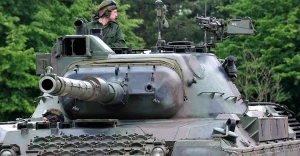
Russia aims to turn Ukraine’s second-largest city into “gray zone”
Amidst relentless Russian bombardment of Kharkiv, officials appeal for international support to bolster air defenses against escalating aggression, as fears of a forthcoming summer offensive loom large
Several days have passed since a 250kg Russian glide bomb found its target in Iryna Tymokhyna’s courtyard, The Economist writes. The 60-year-old woman directs her ire towards Vladimir Putin and the minority of Kharkiv residents whom she believes still support him. Amidst the dust and shattered glass that now adorn her apartment, she recounts the injuries inflicted upon her neighbors and the tragic death of a passing bicycle courier.
“If it was up to me,” she told the outlet, “I would shoot the bastards...and I’d wipe Belgorod [the closest Russian city] off the face of the earth while I was at it.”
Russia intensified its bombardment of Kharkiv in December, coinciding with headlines highlighting issues with American military aid. Since then, the city has faced an onslaught of ballistic missiles unprecedented since the onset of the war. Drone attacks have become more frequent, featuring enhanced speed, altitude, and technology, making them challenging to intercept. The pivotal moment arrived on March 27th with the attack on 23rd August Street, marking the first deployment of a glide bomb — a devastating weapon launched from aircraft capable of traveling significant distances — to strike Ukraine's second-largest city.
The assault, occurring five days after a missile barrage crippled Kharkiv's power generation, unleashed over a week of operations utilizing glide bombs, missiles, and drones. Local news reports indicate at least 16 fatalities and over 50 injuries. Sinister tactics emerged, including "double-tap" strikes targeting first responders, prompting military sources in Kyiv to speculate about Russia's intent to render the city uninhabitable for civilians.
The relentless onslaught on Kharkiv's civilian population persists, with Russian attacks occurring almost daily. On April 7th, the city faced another air assault resulting in injuries to four individuals. Targets included the central park and industrial zone, with damages reported to a residential property and a garage fire ignited. The city’s mayor Ihor Terekhov reported additional strikes later in the day, underscoring an escalation in aggression. Russian forces, predominantly utilizing S-300 missiles from Belgorod, Russia, and increasingly deploying Shahed drones, deny targeting civilians despite mounting evidence and witness accounts.
In the face of such adversity, Kharkiv's mayor, Ihor Terekhov, vehemently opposes the bleak outlook, affirming the city's resilience.
"Regarding the exhaustion of Kharkiv – Russians won't succeed. There's no panic in the city. Russia's intimidation tactics don't work – people are united," he said.
Commenting on the possibility of evacuation from Kharkiv, Terekhov stressed he sees no reason for it.
"The evacuation is being carried out from the area where the fighting is ongoing. And these people are going to Kharkiv. Currently, the city has 1.3 million residents. So far, neither we nor the military see any reason to evacuate Kharkiv. This is a part of the Russian PSYOP to intimidate and make the citizens nervous," the mayor said.
Despite daunting challenges, including the restoration of power without functioning stations, Terekhov remains steadfast, hinting at covert strategies while pleading for Western assistance in bolstering air defenses against new threats.
"The worst case scenario for me is constant air attacks on Kharkiv. That is why we need modern air defense systems," Terekhov said.
Ukraine looks for ways to strengthen Kharkiv's air defense
President Volodymyr Zelenskyy echoed concerns about Kharkiv's vulnerability, describing the situation as "very tough." He highlighted the incessant terror inflicted by Russian occupying forces through bombings in the region.
"We are seeking ways to enhance Kharkiv's air defense, and this responsibility falls on both the military and all diplomats of Ukraine, everyone engaged in international communication and involved in dialogue with our partners on a daily basis," stated Zelenskyy.
The President stressed that Ukraine is clearly lacking in air defense capabilities, and it's essential for "the world to hear this suffering" inflicted by Russian aggressors on cities like Kharkiv, Kupyansk, Donetsk, Zaporizhzhia, Sumy, and numerous other Ukrainian communities.
Russia's intentions remain ambiguous, though indications of a forthcoming summer offensive loom large. Intelligence sources suggest significant troop training in eastern Siberia, with President Volodymyr Zelensky's announcement of further mobilization in June heightening tensions. While Kharkiv is not the primary target, its vulnerability has been spotlighted in Russian media, potentially as part of an information campaign or to placate pro-war sentiments.
Despite the challenges, Russia faces daunting obstacles in capturing Kharkiv, as demonstrated by its failed attempt in 2022. Nonetheless, fears persist of escalating brutality should Russia fail to achieve its objectives. For some residents, such apprehension prompts preemptive departure, reflecting a broader erosion of commerce and stability, albeit with pockets of resilience.
Despite the turmoil, life perseveres in Kharkiv, symbolized by the city's decision to construct subterranean schools as a testament to resilience. Ms. Tymokhyna, offering tea amidst her makeshift living space, embodies this spirit, expressing readiness to defend her homeland at any cost. As she recounts two years of adversity, her resolve remains unshaken, epitomizing the unyielding spirit of a populace determined to protect their freedom.
- News














































